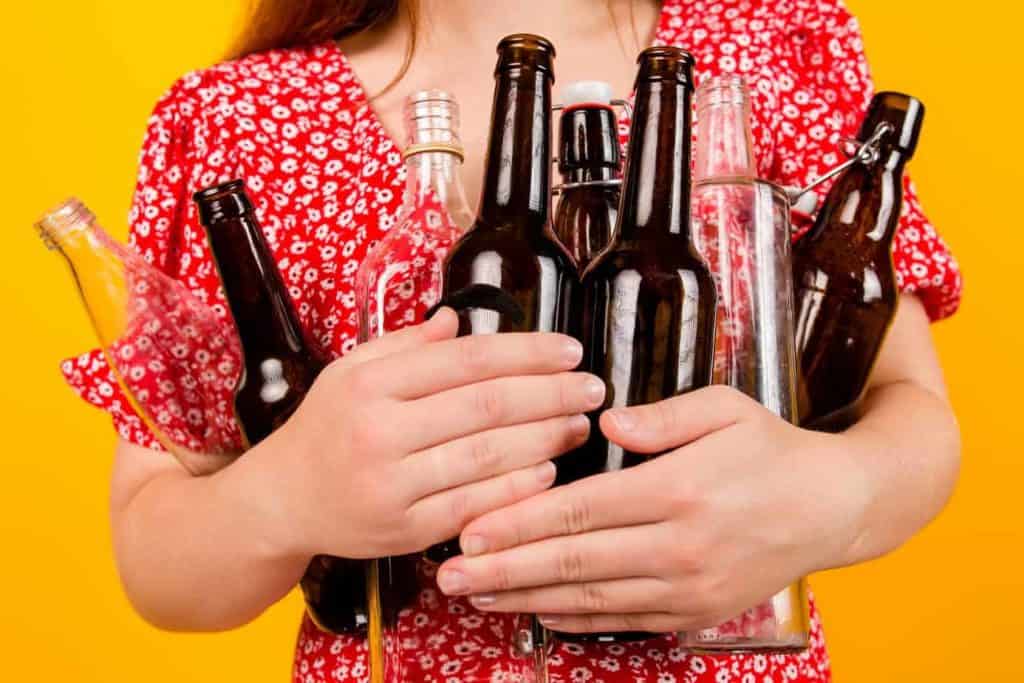What is Breastfeeding?
Breastfeeding, also called nursing, is feeding human breast milk to a child, either directly from the breast or by expressing the milk from the breast and bottle-feeding it to the infant. Breastfeeding is the usual way of providing young infants with the nutrients for healthy growth and development. Virtually all mothers can breastfeed, provided they have accurate information and the support of their family, the health care system, and society at large. It is dangerous to drink alcohol and breastfeeding for both the mother and child, and this is aside from the problem of alcohol use disorder and how to take care of the baby.
Breastfeeding is the best way of providing young infants with the nutrients they need for healthy growth and development. Virtually all mothers can breastfeed, provided they have accurate information and the support of their family, the health care system, and society at large.
WHO recommends exclusive breastfeeding for the first six months of life, followed by continued breastfeeding with appropriate complementary foods for up to 2 years and beyond. WHO also recommends early and uninterrupted skin-to-skin contact, rooming-in, and kangaroo mother care which significantly improve neonatal survival and reduce morbidity.
In the Western Pacific, 12 Member States have adopted national legal measures aligned with the International Code of Marketing for Breastmilk Substitutes to protect, promote, and support breastfeeding[1].


Get Your Life Back
Find Hope & Recovery. Get Safe Comfortable Detox, Addiction Rehab & Dual Diagnosis High-Quality Care.
Hotline(844) 597-1011What is Alcohol?
It is classed as a depressant, which slows down vital functions—resulting in slurred speech, unsteady movement, disturbed perceptions, and an inability to react quickly.
As for how it affects the mind, it is best understood as a drug that reduces a person’s ability to reason and distorts their judgment. Although classified as a depressant, the amount of alcohol consumed determines the type of effect. Most people drink for the stimulant effect, such as a beer or glass of wine taken to “loosen up.” But if a person consumes more than the body can handle, they then experience alcohol’s depressant effect.
They start to feel “stupid” or lose coordination and control. Alcohol overdose causes even more severe depressant effects (inability to feel pain, toxicity where the body vomits the poison, and finally unconsciousness or, worse, coma or death from severe toxic overdose). These reactions depend on how much is consumed and how quickly.
There are different kinds of alcohol. Ethyl alcohol (ethanol), the only alcohol used in beverages, is produced by the fermentation of grains and fruits. Fermenting is a chemical process whereby yeast acts upon certain ingredients in the food, creating alcohol.

The COVID-19 pandemic has created unique conditions with the potential to increase risks associated with alcohol misuse markedly. For example, the stress associated with social isolation, fear of infection, economic disruptions, and loss of loved ones affect behaviors and attitudes that lead to drinking behaviors. In addition, disinhibition associated with intoxication and the contexts in which drinking occurs may lead to increased risks of exposure and infection with the SARS-CoV-2 virus[2].
Overview of Alcohol and Breastfeeding risks
An alcoholic drink is a drink that contains ethanol, a type of alcohol produced by the fermentation of grains, fruits, or other sources of sugar that acts like a drug. The consumption of alcohol plays an essential social role in many cultures. As a result, most countries have laws regulating the production, sale, and consumption of alcoholic beverages.
Breastfeeding mothers and lactating parents often receive conflicting advice about whether alcohol consumption can affect their baby. While warnings are often given not to consume alcohol during pregnancy due to evidence that it could cause damage to an unborn child, the risks of drinking alcohol while breastfeeding have not received as much research attention. Several studies have focused on the effects of alcohol on lactation and the infant, but long-term outcomes are still unknown.
Especially when consumed in large amounts, alcohol can cause drowsiness, deep sleep, weakness, and abnormal weight gain in the infant. There is also a possibility of decreased milk-ejection reflex in the mother. No harmful effects to babies have been found when breastfeeding mothers drink no more than one drink a day. Depending on how much alcohol you consume before you nurse your baby, you may experience several effects from the alcohol in your milk. Even a small to moderate amount of alcohol may impair milk production and the milk ejection reflex. Some of the adverse effects on the baby may be:
- Sleep disturbances
- Increased crying
- Increased startling
- Increased arousal
- High REM sleep in the period from 3.5 hours to 24 hours after exposure to alcohol
- Decreased milk intake by the baby
- Decreased weight gain
Potentially, depending on how much you drink and when you nurse your baby after drinking, there may be other, more severe effects on your baby as well. As a result, the guidance on drinking and nursing is changing. According to the CDC, “moderate alcohol consumption is defined as having up to 1 drink per day for women and up to 2 drinks per day for men”[3]. We go into more detail below.
Get Help. Get Better. Get Your Life Back.
Searching for Accredited Drug and Alcohol Rehab Centers Near You?
Even if you have failed previously and relapsed, or are in the middle of a difficult crisis, we stand ready to support you. Our trusted behavioral health specialists will not give up on you. When you feel ready or just want someone to speak to about therapy alternatives to change your life call us. Even if we cannot assist you, we will lead you to wherever you can get support. There is no obligation. Call our hotline today.
(844) 597-1011Is drinking alcohol and breastfeeding safe for infants?
Not drinking alcohol is the safest option for breastfeeding mothers. Generally, moderate alcohol consumption by a breastfeeding mother (up to 1 standard drink per day) is not harmful to the infant, especially if the mother waits at least 2 hours after a single drink before nursing. However, exposure to alcohol above moderate levels through breast milk could damage an infant’s development, growth, and sleep patterns. Alcohol consumption above-average levels may also impair a mother’s judgment and ability to care for her child safely.
Drinking alcoholic beverages is not an indication to stop breastfeeding. However, consuming more than one drink per day is not recommended. Breast-feeding and alcohol don’t mix well. In addition, there’s no level of alcohol in breast milk that’s considered safe for a baby to drink.
When you drink alcohol, it passes into your breast milk at concentrations similar to those found in your bloodstream. Although a breast-fed baby is exposed to just a fraction of the alcohol their mother drinks, a newborn eliminates alcohol from their body at only half the rate of an adult.
Research suggests that breast-fed babies exposed to one drink a day might have impaired motor development and that alcohol can cause changes in sleep patterns. Also, while folklore says that drinking alcohol improves milk production, studies show that alcohol decreases milk production. The presence of alcohol in breast milk causes babies to drink about 20% less breast milk.
If you choose to drink, avoid breastfeeding until the alcohol has completely cleared your breast milk. This typically takes two to three hours for 12 ounces (355 milliliters) of 5% beer, 5 ounces (148 milliliters) of 11% wine, or 1.5 ounces (44 milliliters) of 40% liquor, depending on your body weight. If you plan to drink alcohol, consider having a drink just after breastfeeding so that the alcohol begins to clear your breast milk during the natural interval between breastfeeding sessions.
Pumping and dumping breast milk doesn’t speed the elimination of alcohol from your body. However, if you miss a breastfeeding session, pumping and dumping will help you maintain your milk supply and avoid engorgement.
Remember, breastfeeding is the optimal way to feed a newborn and is recommended until at least age one. If you choose to drink, plan carefully to avoid exposing your baby to alcohol.
First-class Facilities & Amenities
World-class High-Quality Addiction & Mental Health Rehabilitation Treatment
Rehab Centers TourRenowned Addiction Centers. Serene Private Facilities. Inpatient rehab programs vary.
Addiction Helpline(844) 597-1011Proven recovery success experience, backed by a Team w/ History of:
15+
Years of Unified Experience
100s
5-Star Reviews Across Our Centers
10K
Recovery Success Stories Across Our Network
- Low Patient to Therapist Ratio
- Onsite Medical Detox Center
- Comprehensive Dual-Diagnosis Treatment
- Complimentary Family & Alumni Programs
- Coaching, Recovery & Personal Development Events
Blood alcohol levels in breast milk after drinking alcohol and breastfeeding?
Alcohol levels are usually highest in breast milk 30-60 minutes after an alcoholic beverage is consumed and can be generally detected in breast milk for about 2-3 hours per drink after it is finished. However, the length of time alcohol can be seen in breast milk will increase the more alcohol a mother consumes[4]. For example, alcohol from 1 drink can be detected in breast milk for about 2-3 hours, alcohol from 2 drinks can be seen for about 4-5 hours, and alcohol from 3 drinks can be detected for about 6-8 hours.
However, blood alcohol levels and the length of time alcohol can be seen in breast milk after drinking will depend on several factors, including the amount of alcohol consumed, how fast the alcohol is consumed, whether it is finished with food, how much a mother weighs, and how fast alcohol is broken down in a mother’s body.
What effect does alcohol and breastfeeding have on an infant?
Moderate alcohol consumption by a breastfeeding mother (up to 1 standard drink per day) is not harmful to the infant, especially if the mother waits at least 2 hours before nursing. However, higher levels of alcohol consumption can interfere with the milk ejection reflex (letdown) while maternal alcohol levels are high. Over time, excessive alcohol consumption could lead to shortened breastfeeding duration due to decreased milk production. Excessive alcohol consumption while breastfeeding could also affect the infant’s sleep patterns and early development.
Can expressing/pumping breast milk after consuming alcohol reduce the alcohol in the mother’s milk?
No. The alcohol level in breast milk is essentially the same as in a mother’s bloodstream. Expressing or pumping milk after drinking alcohol and then discarding it (“pumping and dumping”) does NOT reduce the amount of alcohol in the mother’s milk more quickly. As the mother’s alcohol blood level falls over time, the alcohol level in her breast milk will also decrease. A mother may choose to express or pump milk after consuming alcohol to ease her physical discomfort or adhere to her milk expression schedule.
If a mother decides to tell or pump milk within two hours (per drink) of consuming alcohol, the mother may choose to discard the expressed milk. Suppose a mother has destroyed more than a moderate amount of alcohol. In that case, she may decide to wait 2 hours (per drink) to breastfeed her child or feed her infant with milk that had been previously expressed when she had not been drinking to reduce her infant’s exposure to alcohol. Breast milk continues to contain alcohol as long as alcohol is still in the mother’s bloodstream.
What are your baby’s health risks if you are drinking alcohol and breastfeeding?
Depending on the amount of alcohol consumed by the mother/lactating parent, and depending on when the baby is breastfed after alcohol consumption, various researchers have found the most common adverse outcomes for the baby to be[5]:
- Sleep disturbances, including shorter sleep periods, more frequent wakefulness, and less total active and REM sleep in the three-hour-period after consuming alcohol
- Increased crying
- Increased startling
- Increased arousal
- Increased REM sleep in the period from 3.5 hours to 24 hours after exposure to alcohol
- Decreased milk intake by the baby
- Growth retardation
- Impaired immune function
- Delay of motor development
- Potential impairment of cognitive development
- Reduction in the ability for abstract reasoning at school age (6-7 years)
The Academy of Breastfeeding Medicine state in Clinical Protocol #21 that consuming alcohol during lactation has several adverse effects ranging from mild to severe. This is dependent on the amount of alcohol the mother/lactating parent has finished and other factors related to how quickly their body processes alcohol [6]. As alcohol is thoroughly water- and fat-soluble, it enters the bloodstream and human milk very quickly. The amount of alcohol in a nursing mother’s milk after consuming one standard drink is about 95% of the amount of alcohol in the mother’s lactating bloodstream.

World-class, Accredited, 5-Star Reviewed, Effective Addiction & Mental Health Programs. Complete Behavioral Health Inpatient Rehab, Detox plus Co-occuring Disorders Therapy.
CALL(844) 597-1011End the Addiction Pain. End the Emotional Rollercoaster. Get Your Life Back. Start Drug, Alcohol & Dual Diagnosis Mental Health Treatment Now. Get Free No-obligation Guidance by Substance Abuse Specialists Who Understand Addiction & Mental Health Recovery & Know How to Help.
What other Effects Should I Consider When Deciding Whether and When to Drink Alcohol and breastfeeding?
Depending on how much you drink, in addition to the effects on your milk production and ejection reflex, you can expect some degree of other products on yourself.
Alcohol produces sedative effects as well as some stimulant effects. There is some evidence that suggests that people who are currently lactating may metabolize alcohol more quickly than non-lactating people. There is clear evidence that eating food while consuming alcohol also reduces blood alcohol levels after consumption. Drinking alcohol on an empty stomach increases the effects of alcohol on prolactin and oxytocin and your body. You should not sleep with your baby if you drink alcohol, as your natural reflexes have been impaired.
The We Level Up treatment centers provide world-class care with round-the-clock medical professionals available to help you cope. We work as an integrated team providing information about alcohol and breastfeeding and other aspects of treatment. Make this your opportunity to reclaim your life. Call today to speak with one of our treatment specialists. Our specialists know what you are going through and will answer any of your questions.
Your call is private and confidential, and there is never any obligation.
Experience Transformative Recovery at We Level Up Treatment Centers.
See our authentic success stories. Get inspired. Get the help you deserve.
Start a New Life
Begin with a free call to an addiction & behavioral health treatment advisor. Learn more about our dual-diagnosis programs. The We Level Up Treatment Center Network delivers recovery programs that vary by each treatment facility. Call to learn more.
- Personalized Care
- Caring Accountable Staff
- World-class Amenities
- Licensed & Accredited
- Renowned w/ 100s 5-Star Reviews
We’ll Call You
Sources
[1] WHO – https://www.who.int/westernpacific/health-topics/breastfeeding
[2] NIAAA – https://www.niaaa.nih.gov/search?search=alcohol
[3] CDC – https://www.cdc.gov/alcohol/faqs.htm#excessivealcohol
[4] CDC – https://www.cdc.gov/breastfeeding/breastfeeding-special-circumstances/vaccinations-medications-drugs/alcohol.html
[5] Haastrup, M. B., Pottegård, A., & Damkier, P. (2013). Alcohol and breastfeeding. Basic & Clinical Pharmacology & Toxicology 114 pp. 168-173. doi: 10.1111/bcpt.12149
[6] The Academy of Breastfeeding Medicine. (2015). ABM Clinical Protocol #21: Guidelines for breastfeeding and substance use or substance use disorder, Revised 2015. Breastfeeding Medicine 10(3) pp. 135-141. doi: 10.1089/bfm.2015.9992
[7] CDC – https://www.cdc.gov/alcohol/index.htm


